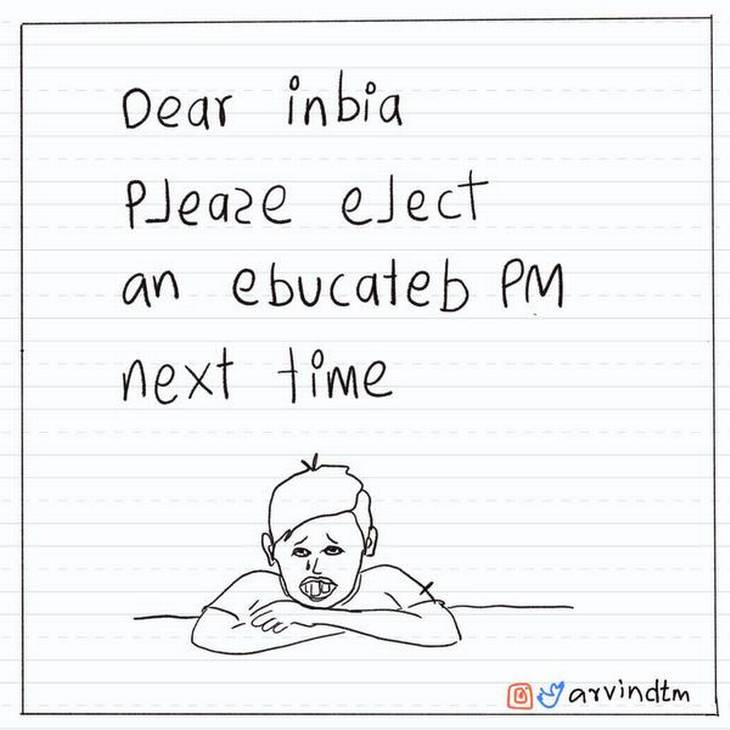The other day at a public event, in response to the description a young woman was giving about her dyslexia-related project, our Prime Minister asked if it would benefit 40- to 50-year-old children. Given that Mr. Modi has never seemed reluctant to make personal remarks about Rahul Gandhi, the audience got the joke, and laughed obligingly. When the understandably nervous young woman let out the required giggle and said it would, Mr. Modi said it would make the mothers of such children happy. The crowd tittered again.
If Mr. Gandhi does live with dyslexia, it was a tasteless joke, getting a laugh out of a condition that takes a lot of hard work to overcome. If Mr. Gandhi does not live with dyslexia, then it’s worse, because the only explanation is that Mr. Modi was using it as an insult, and by doing so he demeaned everyone who lives with the condition.
Unfortunately, Mr. Modi is not alone in using terms that describe learning disabilities as slurs. Not too long ago, people opposed to the Nehru-Gandhis delightedly passed around the story that Priyanka Gandhi Vadra has bipolar disorder, which they thought was not only risible but something that made her unfit for public life. And Mr. Gandhi must also carry blame: in early February, at a press conference, he rhetorically asked if Mr. Modi had schizophrenia.
Our sick vocabulary
This malady — and I don’t mean whatever disorder or illness the Gandhi siblings might or might not have — isn’t something that only afflicts our ruling dispensation or even our political classes. It’s a large chunk of us who use the names for conditions like these — learning disabilities, intellectual disabilities, physical disabilities, mental illness and disorders — as slurs. I have heard, way too often, ‘retard’ used as an insult when someone says something stupid. And ‘spaz’ when someone has a clumsy moment; this is apparently the cool way to say spastic or spasticity, which describes the condition people with cerebral palsy can have, making it difficult for them to control their muscles.
Let me not absolve myself. If I have any preternatural sensitivity about these terms, it may be because my brother lived with both mental retardation (as intellectual disability was labelled when he was diagnosed) and cerebral palsy. And despite this seeming wokeness, I’ve asked unobservant people if they were blind or deaf, and meant those terms rudely, and, such gods as there may be forgive me, I’ve retold and made up jokes about disabilities other than those I was familiar with.
The argument in favour of this kind of vocabulary most often goes something like this: If I called him a donkey, I’m insulting him, not donkeys. (I got variations of this from some Mo-DiVotees when I posted on Twitter about my disappointment with our PM.) Or: Stop being such a politically correct stuffed shirt; I’m obviously not making fun of intellectual disability/ cerebral palsy/ whatever, I’m insulting this other person. Or even better: I can insult myself by calling myself a retard, no? What’s your problem?
Here’s the deal. You’re doing donkeys an injustice, but, hey, donkeys don’t understand human language well enough to be hurt by the insinuation, so while I hope you’re behind one when it’s feeling feisty, go ahead, knock yourself out.

A cartoon by Aravinda Tegginamath that went viral on Twitter.
Dyslexia is a learning disability, one which makes it hard to read and absorb things, but people can and do overcome it. Bipolar disorder is debilitating, but it is treatable when diagnosed, and people with the condition can and do lead happy and productive lives. Neither diagnosis implies diminished intelligence, so anyone using either term as an insult is, quite simply, inaccurate.
People, like us
Here’s an example. Person A, let’s call him Vijay, is known for his fondness for food and it shows in his waistline. Our circle of friends knows this. At dinner, if you serve yourself more than anyone else, and I were to say to you, stop being such a Vijay, we will both know what I mean. Our friends may laugh. If Vijay were with us, he might laugh too, but the smile won’t reach his eyes. He’d be hurt by my unkind insinuation.
Kindness is arguably more important than pedantic correctness. When we use words that describe conditions other people have, those people are around us. They will know who you mean to insult, but they will flinch, because they are demeaned too. This is even more true when you’re an eminent person with a public platform, someone from whom many of us take our example. Leave alone people struggling with mental health issues or learning disabilities, even people with severe intellectual disabilities have feelings, and hearing this tells them they are somehow inferior. (An aside. I’ve been told the term ‘mental retardation’ is not used as a descriptor for intellectual disability any more, so it’s okay to use it. But it’s not, because ‘mental retardation’ for many people is still a quasi-clinical term.)
Understand privilege
So, how does one know what words are wrong to use when one wants to be very, very rude to someone one despises? After much stumbling and murmured advice from patient friends and, ironically, social media, the simple yardstick I have learned to apply is that of privilege.
Castigate with comparisons, but choose who you compare them to carefully, because when you use names of disabilities as insults, you may have no intent to hurt, but you are speaking from a position of privilege, of not having that disability. And you are denigrating the disability and the people who have it.
In going for the unkind laugh, Mr. Modi lost an opportunity to bring dyslexia into the national discourse in a good way. And this makes me sad.
But hey, we are talking now. So maybe it was all a plan. Achoo. I may be coming down with Namonia.
First published by The Hindu on 9 Mar. 2019